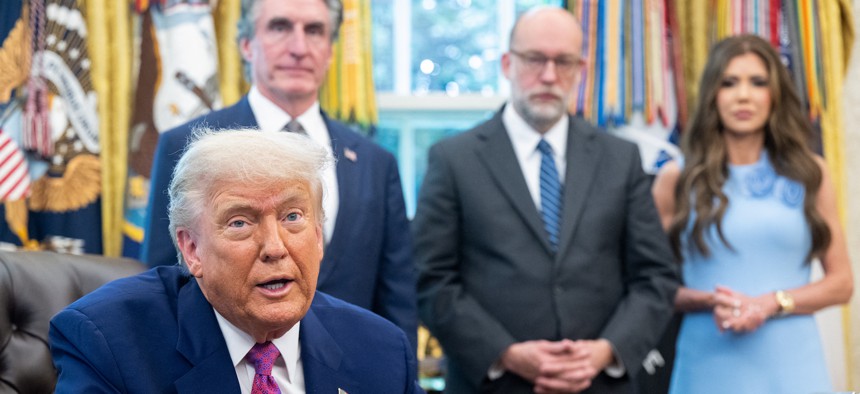
President Donald Trump, alongside Interior Secretary Doug Burgum, Office of Management and Budget Director Russell Vought and Homeland Security Secretary Kristi Noem in the Oval Office on June 10, 2025. Trump and Noem discussed some of the ways they would like to reform the Federal Emergency Management Agency. SAUL LOEB / Getty Images
Trump’s plan to overhaul disaster agency once hurricane season is over prompts Democratic concerns
The Federal Emergency Management Agency has already experienced staffing cuts and leadership changes ahead of an “above-normal” hurricane season.
After Trump administration officials on Tuesday said that the Federal Emergency Management Agency would be “eliminated as it exists today” after this year’s hurricane season, congressional Democrats criticized the president’s proposal for states to take more of the responsibility for disaster response and recovery.
“For decades, FEMA has been a critical part of how the federal government responds to hurricanes and other disasters to protect people and property. Eliminating this critical agency means getting rid of a safety net for millions of people that rely on the federal government when disaster strikes,” said House Homeland Security Committee ranking member Bennie Thompson, D-Miss., and Emergency Management and Technology Subcommittee ranking member Tim Kennedy, D-N.Y., in a statement. “We cannot pull the rug out from underneath states — which may or may not have resources available — and insist they be ready to handle back-to-back, large-scale disasters by themselves.”
Trump, who has been targeting FEMA since the start of his second term, said he wants to “wean off” the agency.
“These governors can handle it. And they'll work in conjunction with other governors. They'll give each other a hand,” he said during an Oval Office briefing on hurricane and wildfire preparedness. “But the FEMA thing has not been a very successful experiment. Very, very expensive and it doesn't get the job done.”
Homeland Security Secretary Kristi Noem said the “state-first” approach was already influencing hurricane preparations.
“While we are running this hurricane season, making sure that we have pre-staged and worked with the regions that are traditionally hit in these areas, we're also building communication and mutual aid agreements among states to respond to each other so that they can stand on their own two feet with the federal government coming in amid catastrophic circumstances with funding,” she said during the same briefing.
Trump also said that “we’re going to give out less money” but that it will be sent to states directly.
FEMA is statutorily authorized, so it’s unclear what changes the president could unilaterally make to the agency without congressional approval. Trump’s overhauls in other parts of government have faced numerous court challenges.
Hurricane season began on June 1 and lasts until Nov. 30. The National Oceanic and Atmospheric Administration forecasted six to 10 hurricanes this year, which is above average.
Noem said in the Oval Office that FEMA is prepared for “higher than usual activity,” but CNN reported that the agency has lost 10% of its total staff since January and is projected to shrink its workforce by 30% by the end of the year.
Additionally, the Trump administration removed the former acting leader of FEMA, Cam Hamilton, after he testified before Congress that he did “not believe it is in the best interest of the American people to eliminate the Federal Emergency Management Agency.” He was replaced with David Richardson, who in January had been appointed the assistant secretary of DHS’ Countering Weapons of Mass Destruction Office.
A senior DHS spokesperson said in a statement to Government Executive that FEMA is “fully activated” for hurricane season.
"Under Secretary Noem and acting Administrator Richardson, FEMA is shifting from bloated, DC-centric dead weight to a lean, deployable disaster force that empowers state actors to provide relief for their citizens,” they said. “The old processes are being replaced because they failed Americans in real emergencies for decades.”
Trump in March signed an executive order requiring officials by the end of the calendar year to review national preparedness and response policies and make recommendations for revisions, recission and replacements. Concurrently, DHS convened a bipartisan council, which is co-chaired by Noem and Defense Secretary Pete Hegseth, to advise on proposed FEMA overhauls.
How are these changes affecting you? Share your experience with us:
Sean Michael Newhouse: snewhouse@govexec.com, Signal: seanthenewsboy.45
NEXT STORY: AI-driven contract cuts at VA spark concern







